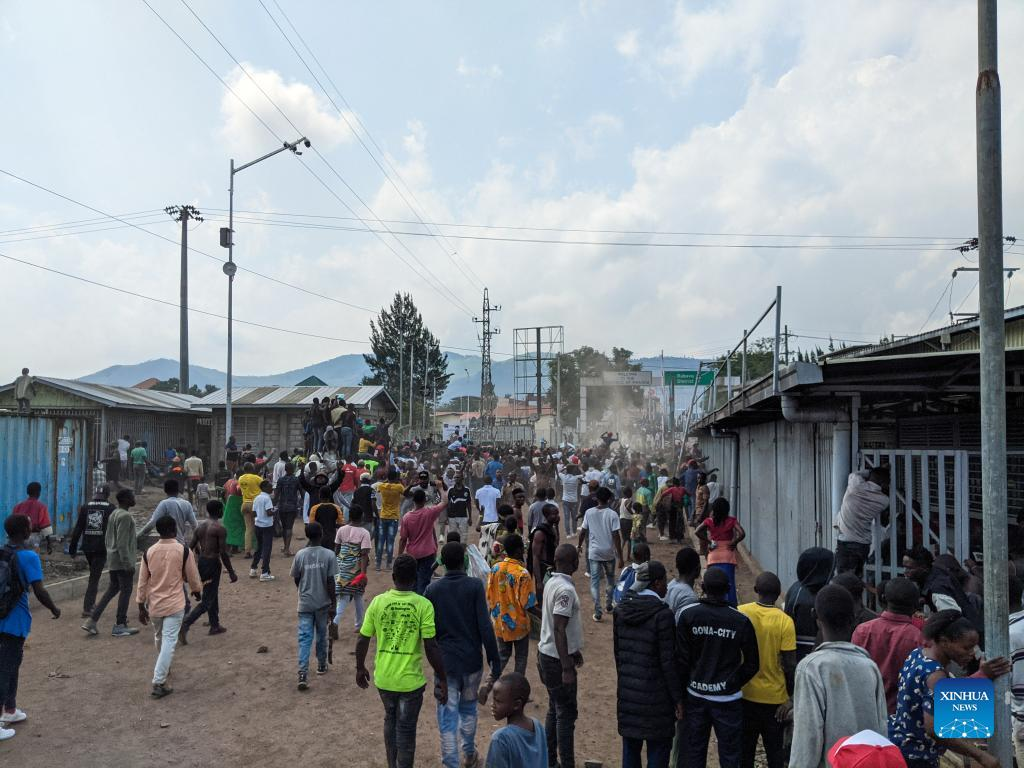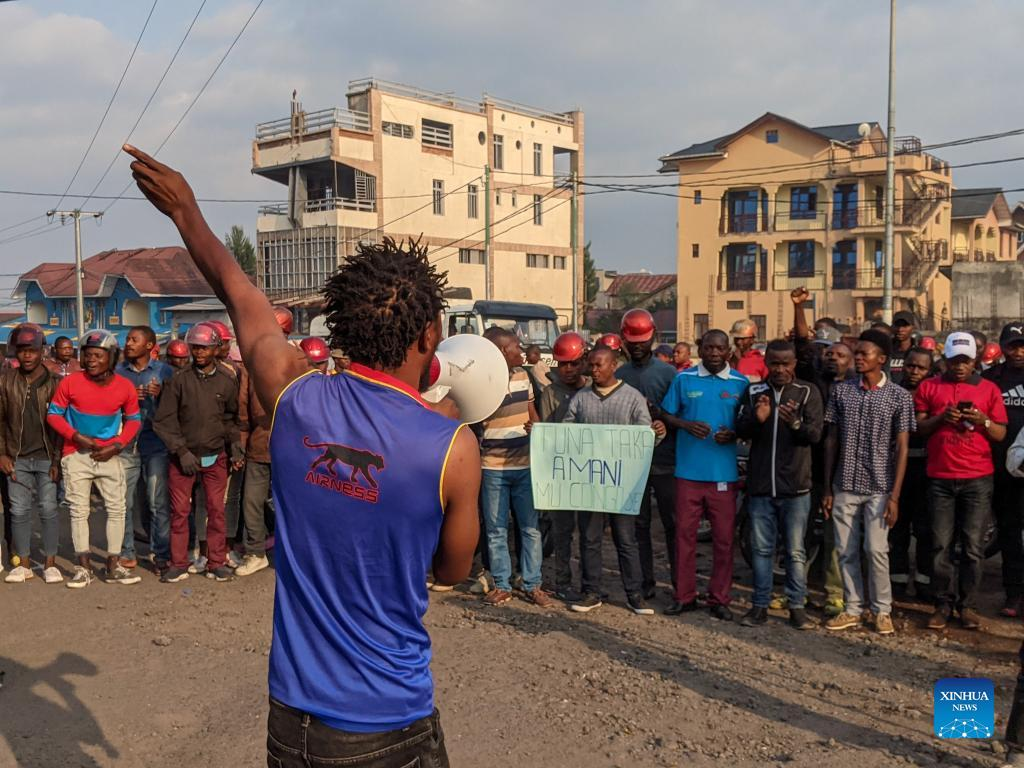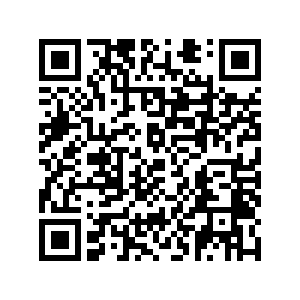
Photo taken on June 15, 2022 shows people at a peaceful demonstration against rebels of the March 23 Movement (M23) in Goma, northeastern Democratic Republic of the Congo (DRC). (Photo by Zanem Nety Zaidi/Xinhua)
KINSHASA, June 16 (Xinhua) -- The Democratic Republic of the Congo (DRC) decided late Wednesday to ask its government to "suspend all protocol agreements, agreements and conventions" concluded with Rwanda, a new episode of the diplomatic spat between the two neighboring countries, provoked and fueled by Kigali's alleged support for the March 23 Movement (M23).
As rebels of the M23 have been on the offensive in northeastern DRC since late March and reportedly occupied a key town since Monday, Kenya's President Uhuru Kenyatta, also Chairperson of the East African Community, called Wednesday for the immediate deployment of a new regional military force to try to stop rebel violence in the eastern DRC.
TIME OFF
Kinshasa made the decision to "suspend all protocol agreements, agreements and conventions" concluded with Rwanda, according to an official statement, released after a national defense meeting held late Wednesday chaired by the Congolese President Felix Tshisekedi.
This is the second national defense meeting chaired by Tshisekedi since M23's resurgence in late March. At the last meeting in late May, DRC classified the M23 as a terrorist group and decided to suspend all flights of RwandAir, the flag carrier airline of Rwanda, to the DRC soil.
Stemming from a former Congolese rebellion, the M23, created in April 2012, quickly gained international notoriety when it occupied the city of Goma, capital of North Kivu, for ten days in November 2012. After its defeat by the army in 2013, the M23 signed a peace accord with the government in December 2013, in which it agreed to demobilize its fighters and transform itself into a political party. However, M23 now accuses the Kinshasa authorities of not respecting the commitments.
Since late March, M23 has been on the offensive in the North Kivu province, with thousands of civilians displaced by still ongoing fighting. Bunagana, a key strategic town bordering Uganda, reportedly fell into the hands of rebels on Monday.
Besides the haunting nightmare of the M23, Kinshasa now faces a diplomatic tug of war with Kigali, with the latter having been accused of supporting the M23 rebels. In early June, Felix Tshisekedi publicly claimed that there was "no doubt" that Rwanda was backing the M23 on the Congolese territory.
Rwanda has denied the charge and instead accused the Congolese army of allying with Rwandan rebels of the Democratic Forces for the Liberation of Rwanda (FDLR), active in eastern DRC, whose elements are blamed for the 1994 genocide against Tutsi.
On Wednesday, the DRC also demanded Rwanda "proceed with the withdrawal of its troops on Congolese soil".
There has been no immediate comment from Rwanda on Kinshasa's latest decisions.
REGIONAL SPILLOVER
On Wednesday, Kenya's President Uhuru Kenyatta, who currently chairs the East African Community (EAC), called for the immediate deployment of a new regional military force to try to stop rebel violence in the eastern DRC, where dozens of armed groups have been active for over two decades.
"The East African Regional Force shall be deployed to the Ituri, North Kivu, and South Kivu provinces immediately to stabilize the zone and enforce peace in support of the DRC security forces and in close coordination with MONUSCO (UN Stabilization Mission in the DRC)," Kenyatta said in a statement, referring to the joint force that the seven EAC members agreed to form at a summit in April.
Kenyatta said that a meeting of regional commanders would be held in Nairobi on Sunday, which "should finalize the preparations to undertake the deployment of the regional force", without providing further detail. Kinshasa, which has become this year EAC's latest member, has not yet commented on Kenyatta's decision.
The eastern DRC, troubled by decade-long insecurity, has prompted regional military operations and deployment, given its proximity to multiple countries that share borders. Since late November 2021, the armed forces of DRC and Uganda have officially launched joint military operations in northeastern DRC against rebels of the Allied Democratic Forces (ADF).
In an exclusive interview with Xinhua last year, Major General Kayanja Muhanga of the Ugandan army stated his determination to destroy "once and for all" the rebels of the ADF, a nightmare for the African Great Lakes region.
PENDING PEACE SUMMIT
The relations between Kinshasa and Kigali have seen signs of thawing under the current administrations as the two countries have been trading verbal blows on different levels and on different occasions.
DRC last Thursday accused Rwanda of sending 500 commandos in disguise into its territory. The two countries have also accused each other of firing rockets across their shared border.
It is already an open secret that Kinshasa has been upset about Kigali's alleged support of M23, as Kigali, while denying all allegations of backing M23, also accused the Congolese army of supporting the FDLR remnants, responsible for the 1994 genocide.
The two neighboring countries share complicated and tangled relations since the tragic genocide in 1994, as Rwandan Hutus accused of slaughtering Tutsis during the 1994 Rwanda genocide arrived in eastern DRC.
However, besides all the tiffs and tit-for-tat, the two countries have also counted on regional mediation and possibly a tete-a-tete between the two presidents in Angola, attempting to bury the hatchet and restore the fragile peace in eastern DRC.
But to this day, the meeting is still pending as neither of the two countries has yet confirmed or announced any detail of the rendezvous.
"We also welcome the nomination of President Joao Lourenco of Angola by the African Union to defuse tensions between the Democratic Republic of the Congo and Rwanda. The UN fully supports these political efforts," said Stephane Dujarric, spokesman for UN Secretary-General Antonio Guterres, in a recent note to correspondents, noting that the UN supports ongoing national and regional political efforts to accompany the disarmament of armed groups, including the Nairobi process launched by the DRC and Kenya. ■

Photo taken on June 15, 2022 shows people at a peaceful demonstration against rebels of the March 23 Movement (M23) in Goma, northeastern Democratic Republic of the Congo (DRC). (Photo by Zanem Nety Zaidi/Xinhua)
